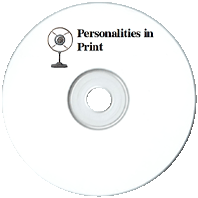

A master of Wordplay, Willard Espy interviewed prominent figures on Personalities in Print.

5 old time radio show recordings
(total playtime 21 min)
available in the following formats:
1 MP3 CD
or
1 Audio CDs
Text on OTRCAT.com ©2001-2025 OTRCAT INC All Rights Reserved. Reproduction is prohibited.

Of all the tools that mankind has devised, the most powerful are words. Words can change history. Words can change the way we understand history. Words can bind us as a group and separate us from the crowd. A kind word can brighten someone's day, an unkind one can scar for life.
As powerful a tool as words can be, they can also be a fun toy. Unlike playing with other tools, learning to have fun with words will make the words you use in serious situations that much stronger.
One of the greatest proponents of word-play was Oysterville, Washington's favorite son, Willard Espy. Oysterville is a village on the Pacific Coast (current population is around 20, not counting tourists or dogs) that Espy's grandfather helped to found after crossing the country on the Oregon Trail.
After graduating from the University of Redlands, Espy spent a year traveling abroad. He enrolled in the Sorbonne in Paris, supposedly to study philosophy (he would later admit that he was more interested in studying French girls). Returning to California in 1932, he worked as a newspaper editor before moving to New York City. He was hired by Reader's Digest in 1941, where he would work for the next sixteen years.
As a student in the small school in Oysterville, Espy dreamed of penning poetry worthy of Shakespeare. As it turned out, his light verse compares favorably with that of Cole Porter, Ogden Nash, and Lewis Carroll. Espy was a master of puns and a genius at anagrams. He once submitted a poem combined with an anagram puzzle to Britain's weekly Punch magazine, the periodical replied that they wanted one for each issue!
Among Espy's duties at the Digest was to compose a monthly cover essay based on an interview with a prominent figure of the era, such as Winston Churchill or Albert Einstein. The mission of the interview was to get the celebrity to say something nice about Reader's Digest. Espy left Reader's Digest in 1957, about the time he was going through a second divorce.
One of his projects after leaving Reader's Digest was the syndicated radio program, Personalities in Print. The program, which had an easy to fill 5-minute format, was very similar to the interviews he did for the Digest essays. Featured interviews include the editor of Good House Keeping who had collected some of President Eisenhower's favorite writing, the first American to use a seeing-eye dog, a tulip bulb importer who had been knighted by the Queen of Holland, and Ellington Herman, a proponent of Jazz Music on the Voice of America.
Willard Espy passed away in February 1999. He was 88. His remains were interred at the Oysterville Cemetery.
Text on OTRCAT.com ©2001-2025 OTRCAT INC All Rights Reserved. Reproduction is prohibited.
You have reached the maximum number of votes for a unregistered user.
Please login or create a new account to continue...
You have reached the maximum number to down votes in this page.



Personalities in Print Disc A001
|
Add Audio CD to Cart - $5.00 |
Please wait...
COMMENTS
Be the first to comment on "Personalities in Print"
Leave a comment